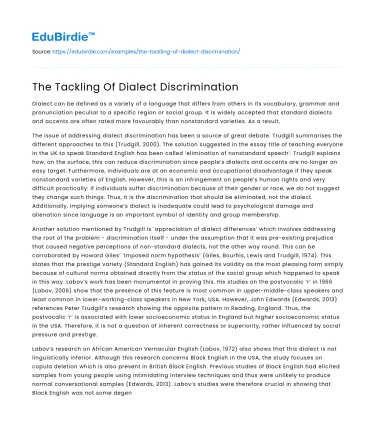Dialect can be defined as a variety of a language that differs from others in its vocabulary, grammar and pronunciation peculiar to a specific region or social group. It is widely accepted that standard dialects and accents are often rated more favourably than nonstandard varieties. As a result,
The issue of addressing dialect discrimination has been a source of great debate. Trudgill summarises the different approaches to this (Trudgill, 2000). The solution suggested in the essay title of teaching everyone in the UK to speak Standard English has been called ‘elimination of nonstandard speech’. Trudgill explains how, on the surface, this can reduce discrimination since people’s dialects and accents are no longer an easy target. Furthermore, individuals are at an economic and occupational disadvantage if they speak nonstandard varieties of English. However, this is an infringement on people’s human rights and very difficult practically: if individuals suffer discrimination because of their gender or race, we do not suggest they change such things. Thus, it is the discrimination that should be eliminated, not the dialect. Additionally, implying someone’s dialect is inadequate could lead to psychological damage and alienation since language is an important symbol of identity and group membership.
Save your time!
We can take care of your essay
- Proper editing and formatting
- Free revision, title page, and bibliography
- Flexible prices and money-back guarantee
Another solution mentioned by Trudgill is ‘appreciation of dialect differences’ which involves addressing the root of the problem - discrimination itself - under the assumption that it was pre-existing prejudice that caused negative perceptions of non-standard dialects, not the other way round. This can be corroborated by Howard Giles’ ‘imposed norm hypothesis’ (Giles, Bourhis, Lewis and Trudgill, 1974). This states that the prestige variety (Standard English) has gained its validity as the most pleasing form simply because of cultural norms obtained directly from the status of the social group which happened to speak in this way. Labov’s work has been monumental in proving this. His studies on the postvocalic ‘r’ in 1966 (Labov, 2006) show that the presence of this feature is most common in upper-middle-class speakers and least common in lower-working-class speakers in New York, USA. However, John Edwards (Edwards, 2013) references Peter Trudgill’s research showing the opposite pattern in Reading, England. Thus, the postvocalic ‘r’ is associated with lower socioeconomic status in England but higher socioeconomic status in the USA. Therefore, it is not a question of inherent correctness or superiority, rather influenced by social pressure and prestige.
Labov’s research on African American Vernacular English (Labov, 1972) also shows that this dialect is not linguistically inferior. Although this research concerns Black English in the USA, the study focuses on copula deletion which is also present in British Black English. Previous studies of Black English had elicited samples from young people using intimidating interview techniques and thus were unlikely to produce normal conversational samples (Edwards, 2013). Labov’s studies were therefore crucial in showing that Black English was not some degenerate variety but a regular dialect governed by rules. For example, Labov shows how copula deletion (the omission of the verb ‘to be’) obeys a categorical rule: the copula appears in the past tense and is deleted in phrases where standard English can contract. Previously, linguists had concluded that there was no present copula of auxiliary such as Steward (1966). This fuelled perceptions that Black English was inferior and uncivilised. Thus Labov’s proof that Black English is rule-governed and logical is essential evidence that dialects are linguistically equal considered inferior due to social influences.
By contrast, the ‘inherent norm hypothesis’ - in opposition to the ‘imposed norm hypothesis’ - would support the ‘elimination of non-standard speech’ and the teaching of Standard English. This claims that a dialect or accent is elevated to its prestige position due to its inherent pleasantness (Giles et al., 1974). For example, in 1932, Robert Chapman praised standard English as ‘one of the most subtle and most beautiful of all expressions of the human spirit’ and, in 1934, Henry Wyld described Received Pronunciation as ‘the most pleasing and sonorous form’ (Edwards, 2013). This suggests that teaching everyone Standard English and Received Pronunciation would allow them to speak the most favourable dialect and thus be subject to less dialect-related discrimination. However, Giles’ research disproves this hypothesis (Giles et al., 1974). For example, one study involving two varieties of the Greek language - the Athenian (prestige form) and Cretan dialects - shows that non-Greek speakers could not differentiate the two dialects in terms of pleasantness. Their perceptions were purely based on the aesthetic quality of the varieties since they were not aware of the different dialects’ social connotations. Thus, the imposed norm hypothesis is more convincing, again showing that it is the discrimination already present that causes different perceptions of dialects - not the other way round.
Nevertheless, ‘appreciation of dialect differences’ has been ‘criticised as hopelessly utopian’ (Trudgill, 2000). Whilst this may be possible in the long term once the degree of tolerance required has been achieved, a compromise - ‘bidialectalism’ - may be more effective. This approach is similar to the method of teaching everyone Standard English but differs in that it encourages the use of a nonstandard dialect at home and in informal settings whilst using Standard English at school and in writing. Whilst not perfect, this does improve non-standard variety speakers’ career prospects and helps to reduce dialect discrimination. Continued use of this approach should allow the ‘appreciation of dialect differences’ to be implemented in the future.






 Stuck on your essay?
Stuck on your essay?

